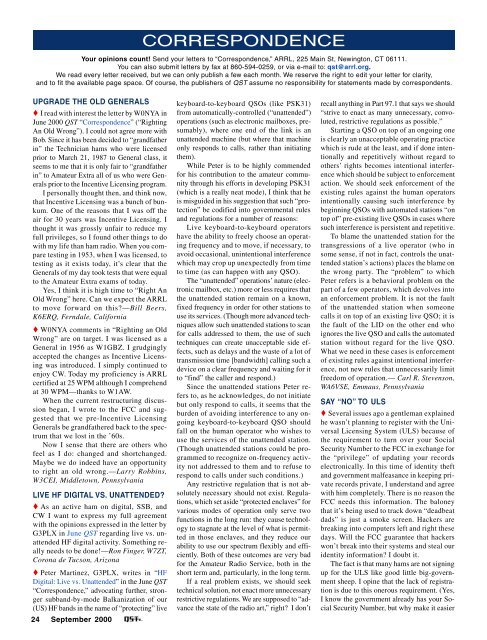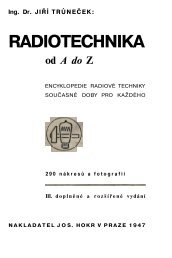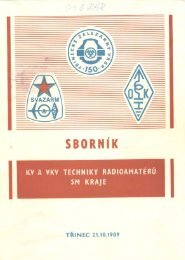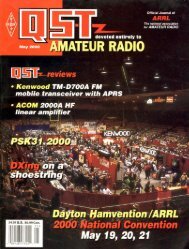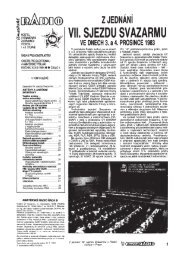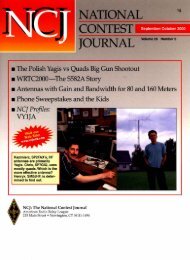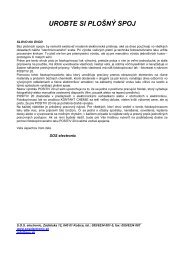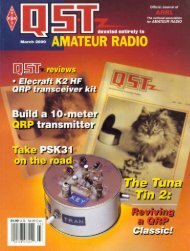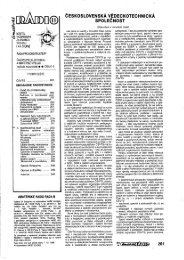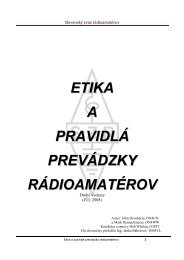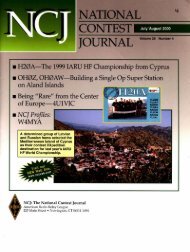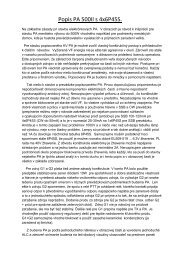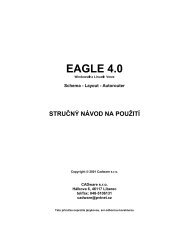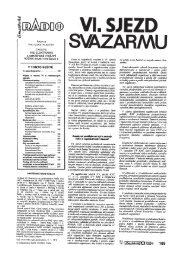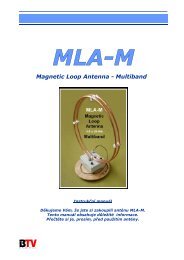CORRESPONDENCEYour opinions count! Send your letters to “Correspondence,” ARRL, 225 Main St, Newington, CT 06111.You can also submit letters by fax at 860-594-0259, or via e-mail to: qst@arrl.org.We read every letter received, but we can only publish a few each month. We reserve the right to edit your letter for clarity,and to fit the available page space. Of course, the publishers of <strong>QST</strong> assume no responsibility for statements made by correspondents.UPGRADE THE OLD GENERALS I read with interest the letter by W0NYA inJune <strong>2000</strong> <strong>QST</strong> “Correspondence” (“RightingAn Old Wrong”). I could not agree more withBob. Since it has been decided to “grandfatherin” the Technician hams who were licensedprior to March 21, 1987 to General class, itseems to me that it is only fair to “grandfatherin” to Amateur Extra all of us who were Generalsprior to the Incentive Licensing program.I personally thought then, and think now,that Incentive Licensing was a bunch of bunkum.One of the reasons that I was off theair for 30 years was Incentive Licensing. Ithought it was grossly unfair to reduce myfull privileges, so I found other things to dowith my life than ham radio. When you comparetesting in 1953, when I was licensed, totesting as it exists today, it’s clear that theGenerals of my day took tests that were equalto the Amateur Extra exams of today.Yes, I think it is high time to “Right AnOld Wrong” here. Can we expect the ARRLto move forward on this?—Bill Beers,K6ERQ, Ferndale, California W0NYA comments in “Righting an OldWrong” are on target. I was licensed as aGeneral in 1956 as W1GBZ. I grudginglyaccepted the changes as Incentive Licensingwas introduced. I simply continued toenjoy CW. Today my proficiency is ARRLcertified at 25 WPM although I comprehendat 30 WPM—thanks to W1AW.When the current restructuring discussionbegan, I wrote to the FCC and suggestedthat we pre-Incentive LicensingGenerals be grandfathered back to the spectrumthat we lost in the ’60s.Now I sense that there are others whofeel as I do: changed and shortchanged.Maybe we do indeed have an opportunityto right an old wrong.—Larry Robbins,W3CEI, Middletown, PennsylvaniaLIVE HF DIGITAL VS. UNATTENDED? As an active ham on digital, SSB, andCW I want to express my full agreementwith the opinions expressed in the letter byG3PLX in June <strong>QST</strong> regarding live vs. unattendedHF digital activity. Something reallyneeds to be done!—Ron Finger, W7ZT,Corona de Tucson, Arizona Peter Martinez, G3PLX, writes in “HFDigital: Live vs. Unattended” in the June <strong>QST</strong>“Correspondence,” advocating further, strongersubband-by-mode Balkanization of our(US) HF bands in the name of “protecting” live24 <strong>September</strong> <strong>2000</strong>keyboard-to-keyboard QSOs (like PSK31)from automatically-controlled (“unattended”)operations (such as electronic mailboxes, presumably),where one end of the link is anunattended machine (but where that machineonly responds to calls, rather than initiatingthem).While Peter is to be highly commendedfor his contribution to the amateur communitythrough his efforts in developing PSK31(which is a really neat mode), I think that heis misguided in his suggestion that such “protection”be codified into governmental rulesand regulations for a number of reasons:Live keyboard-to-keyboard operatorshave the ability to freely choose an operatingfrequency and to move, if necessary, toavoid occasional, unintentional interferencewhich may crop up unexpectedly from timeto time (as can happen with any QSO).The “unattended” operations’ nature (electronicmailbox, etc.) more or less requires thatthe unattended station remain on a known,fixed frequency in order for other stations touse its services. (Though more advanced techniquesallow such unattended stations to scanfor calls addressed to them, the use of suchtechniques can create unacceptable side effects,such as delays and the waste of a lot oftransmission time [bandwidth] calling such adevice on a clear frequency and waiting for itto “find” the caller and respond.)Since the unattended stations Peter refersto, as he acknowledges, do not initiatebut only respond to calls, it seems that theburden of avoiding interference to any ongoingkeyboard-to-keyboard QSO shouldfall on the human operator who wishes touse the services of the unattended station.(Though unattended stations could be programmedto recognize on-frequency activitynot addressed to them and to refuse torespond to calls under such conditions.)Any restrictive regulation that is not absolutelynecessary should not exist. Regulations,which set aside “protected enclaves” forvarious modes of operation only serve twofunctions in the long run: they cause technologyto stagnate at the level of what is permittedin those enclaves, and they reduce ourability to use our spectrum flexibly and efficiently.Both of these outcomes are very badfor the Amateur Radio Service, both in theshort term and, particularly, in the long term.If a real problem exists, we should seektechnical solution, not enact more unnecessaryrestrictive regulations. We are supposed to “advancethe state of the radio art,” right? I don’trecall anything in Part 97.1 that says we should“strive to enact as many unnecessary, convoluted,restrictive regulations as possible.”Starting a QSO on top of an ongoing oneis clearly an unacceptable operating practicewhich is rude at the least, and if done intentionallyand repetitively without regard toothers’ rights becomes intentional interferencewhich should be subject to enforcementaction. We should seek enforcement of theexisting rules against the human operatorsintentionally causing such interference bybeginning QSOs with automated stations “ontop of” pre-existing live QSOs in cases wheresuch interference is persistent and repetitive.To blame the unattended station for thetransgressions of a live operator (who insome sense, if not in fact, controls the unattendedstation’s actions) places the blame onthe wrong party. The “problem” to whichPeter refers is a behavioral problem on thepart of a few operators, which devolves intoan enforcement problem. It is not the faultof the unattended station when someonecalls it on top of an existing live QSO; it isthe fault of the LID on the other end whoignores the live QSO and calls the automatedstation without regard for the live QSO.What we need in these cases is enforcementof existing rules against intentional interference,not new rules that unnecessarily limitfreedom of operation.— Carl R. Stevenson,WA6VSE, Emmaus, PennsylvaniaSAY “NO” TO ULS Several issues ago a gentleman explainedhe wasn’t planning to register with the UniversalLicensing System (ULS) because ofthe requirement to turn over your SocialSecurity Number to the FCC in exchange forthe “privilege” of updating your recordselectronically. In this time of identity theftand government malfeasance in keeping privaterecords private, I understand and agreewith him completely. There is no reason theFCC needs this information. The baloneythat it’s being used to track down “deadbeatdads” is just a smoke screen. Hackers arebreaking into computers left and right thesedays. Will the FCC guarantee that hackerswon’t break into their systems and steal ouridentity information? I doubt it.The fact is that many hams are not signingup for the ULS like good little big-governmentsheep. I opine that the lack of registrationis due to this onerous requirement. (Yes,I know the government already has your SocialSecurity Number, but why make it easier
for them to create that all-encompassing databaseby giving them another unique record?)The Social Security system was implementedwith the promise that the SSN would neverbecome a national ID number. We have seenhow well governments keep promises.Now, we see the FCC trying to spin theirULS miscalculation by issuing a not-so-subtleyou-had-better-register-or-your-licenserecord-might-get-lost-or-reassignedstatement…a friendly suggestion, not a threat,mind you. What shall we see next? The “loss”of several licenses and the subsequent punishmentof these licensees for “operating withouta license” as an example of what mighthappen if you don’t register? Or should I justexpect Janet Reno’s folks to be busting downmy door should I fail to “register” my radiolicense “with the proper authorities”?—Michael Weaver, KD7DDG, Glendale, ArizonaA TALE OF “TEST DAY JITTERS” We’ve all heard of the “test day jitters”and what they can do to candidates tryingto pass their FCC examination for a license.It seems that the worst case involves thecode portion of the exam.How many of us can remember the hoursof diligent practice put forth learning Morsecode in preparation for the big day, only tofind that we just couldn’t function efficientlyknowing that we were under the gunduring the actual test session?This was the problem that plagued onehopeful code candidate at a Clinton (Iowa)Amateur Radio Club ARRL VE test session.Candidate Randy Swemline, KB9KUZ, hadpreviously tested over 12 times at various locations,in an attempt to gain his 5-WPM codecredit. After watching Randy fail his initial CWexam, I sensed his “test fright” and secretlyconferred with fellow team members KE0FT,KF9TL, K0RLM, WJ9D and KB9SJI, suggestingthat we try a psychological “trick.”Under the guise of pretending to checka new version of a code test tape recentlyreceived, the team was asked to listen to,and copy, the code session. Randy was invitedto do so as well. When the tape wascomplete, everyone was asked to exchangecopy sheets and check for correct copy.Upon being checked by all VEs present, wedisclosed to Randy that he had just received—andpassed!—his code exam. Thetest-day jitters had finally been overcome!Since all testing regulations had beencarefully followed and monitored by allaccredited VEs present, KB9KUZ wenthome with a CSCE for his 5-WPM Morsecode exam. He is now reportedly hard atwork studying for the General writtenexam.“Thank you” to my fellow VEs whowent the extra mile!—Roger Gorzney,KD0WY, ARRL VE Team Liaison, ClintonAmateur Radio Club, Clinton, IowaTOROID-A-PHOBIA In two different articles in June <strong>2000</strong> <strong>QST</strong>(page 33 and page 74), toroids are describedin language that implies: (1) they are difficultto wind and (2) elimination of toroids in aproject is an indicator of design expertise.While it is true that winding the correctnumber of turns, stripping the wire, andkeeping track of windings in multifilar toroidsis a more difficult task than bendingthe leads of a resistor and plugging it into aboard, winding a multifilar toroid is a basicskill that may be easily acquired by anyonewith normal eyesight and a little dexterity.Much of the joy of Amateur Radio comesfrom acquiring new skills: conversing inCW, handling traffic in a crisis, and learningadvanced construction techniques. Iwould be shocked to read about “those annoying20-WPM CW operators in the AmateurExtra subbands” or “that annoyingemergency traffic after the earthquake” in<strong>QST</strong>, but it has become routine for <strong>QST</strong> editorsand authors to disparage constructionskills that they have not yet mastered.A skillful designer may eliminate toroidsfrom a beginner project. However,eliminating toroids because the designerdoesn’t like them is not good design. Themultifilar toroid transformer is a high-performance,well-behaved component. It iswidely used in radio circuitry where performanceis more important than cost orease of assembly. World-class professionalradio designers like Wes Hayward, W7ZOI,routinely exploit the benefits of multifilartoroids in <strong>QST</strong> projects, and the youngergeneration learns the basic skills by studying,reproducing, and improving those circuits.In an age when many EE professorshave never actually built anything thatworked, an engineering college graduatewho has built a “Progressive Receiver” isfar more valuable and employable than onewho has only stuffed parts on a silkscreenedboard with no wires, bolted itinto a pre-drilled box, and connected theantenna.<strong>QST</strong> readers are a diverse lot, and somehave an unreasonable fear of learning newskills. One of the functions of <strong>QST</strong> is to inspirereaders to overcome that fear and explorenew territory. For the first few projects,a large, silk-screened PC board with easilyhandled components is appropriate. By thethird or fourth project, winding a few toroidsis a good skill to acquire. Within a yearor two, a beginner can progress to the pointwhere duplicating a Wes Hayward circuitwithout a PC board is routine. The satisfactionof learning new radio construction skills,building a rig, and then using it on the air isas old as the radio art. Let’s keep the traditionalive in <strong>QST</strong> and use language that encouragesreaders to progress beyond the beginnerlevel in radio construction.—RickCampbell, KK7B, Portland, Oregon<strong>September</strong> <strong>2000</strong> 25
- Page 6 and 7: September 2000 Volume 84 Number 9C
- Page 11 and 12: THE AMERICAN RADIORELAY LEAGUE INCT
- Page 14: Get to Know Your Section ManagerThe
- Page 18: Cosponsors for S.2183Introduced by
- Page 22 and 23: Calling All Holiday Photos!Calling
- Page 30 and 31: By David Blaschke, W5UNMBAThe Might
- Page 32 and 33: By Bill Wageman, K5MATGrid Chasing:
- Page 34 and 35: By Dan Wissell, N1BYTThe OCR II Rec
- Page 36 and 37: 34 September 2000 Figure 1
- Page 38 and 39: its signal in a general-coverage re
- Page 40 and 41: By Dick Goodman, WA3USGThe Monster
- Page 42 and 43: Figure 4—Schematic diagram of the
- Page 44 and 45: elative power levels of the control
- Page 46 and 47: The elegant Butterfly with its ATVp
- Page 48 and 49: Ross Hull, 3JU, at his station inMe
- Page 50 and 51: By Jean Wolfgang, WB3IOSJamboree On
- Page 52 and 53: By Lew Malchick, N2RQSchool Club Ro
- Page 54 and 55: By Dave Patton, NT1NARRL Board Thin
- Page 56 and 57: Summary of Major Board ActionsMinut
- Page 58 and 59: Manager, delivered his report on th
- Page 60 and 61: ucts, and promote more efficient us
- Page 62 and 63: Figure 3—To change your display c
- Page 64 and 65: ity suffers. That is, it’s more d
- Page 66 and 67: in building a higher-performance re
- Page 68 and 69: SHORT TAKESEZNEC 3.0 for WindowsBy
- Page 70 and 71: HINTS & KINKSDOX CONTROL FOR A YAES
- Page 72 and 73: HAPPENINGSARRL Says Amateur Service
- Page 74 and 75:
Seminole County to erect a 35-foot
- Page 76 and 77:
Reviewed by Rich Arland, K7SZQST Co
- Page 78 and 79:
through an antenna tuner, and was r
- Page 80 and 81:
to use lighter plug equipped vehicl
- Page 82 and 83:
PUBLIC SERVICEThe Trials and Reward
- Page 84 and 85:
HOW’S DX?Tristan da Cunha and Gou
- Page 86 and 87:
THE WORLD ABOVE 50 MHZInto the 21st
- Page 88 and 89:
were more than half a dozen 2-meter
- Page 90 and 91:
health, safety and aesthetics conce
- Page 92 and 93:
AMATEUR SATELLITESA “Hot” After
- Page 94 and 95:
Christopher R.Gonyea, KB1AZKGoshen,
- Page 96 and 97:
QRP POWERVintage QRPFiring up an ol
- Page 98 and 99:
HAMFEST CALENDAR† ARRL HamfestAtt
- Page 100 and 101:
Mobile to the Max

